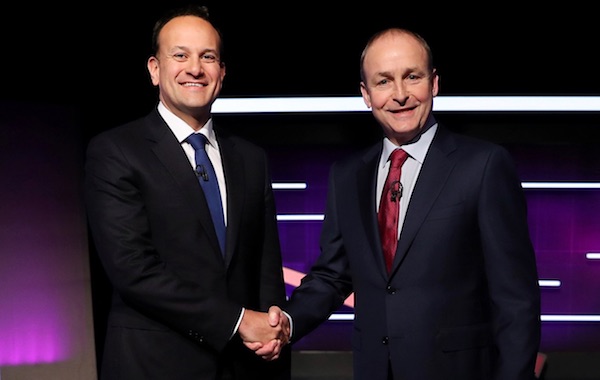
A historic but deeply unpopular coalition government between Fianna Fáil and Fine Gael appears to be on the cards after the Green Party failed to reject a bizzare manifesto issued in a desperate plea for support to prop up the improbable alliance.
The leaders of the two parties with roots as civil war foes have officially signed off on a policy framework document which will pave the way towards the formation of a ‘grand coalition’ with a third party which will govern for the next five years.
Fianna Fáil leader Michael Martin and Fine Gael leader Leo Varadkar issued co-ordinated statement to confirm the ‘historic’ plan.
Although Sinn Féin was returned as the most pupaular party in the State in February’s general election, both Martin and Varadkar, despite coming second and third in the election respectively behind Mary Lou McDonald, have expressed a deep aversion to including Sinn Féin in any government.
After weeks of talks, the pact faces strong opposition within their own parties, particularly in rural areas. Ten Fine Gael councillors in Mayo said they will not support the deal, while the Fianna Fáil leadership has already moved to bypass its own membership in order to approve it.
One elected FF representative said: “This is the f**king end of Fianna Fáil. With this deal we have essentially put Sinn Féin into opposition for the next five years and made them the credible alternative.”
The idea is that the vague policy framework document could become the basis for a programme for the next government.
Sinn Féin’s Pearse Dohery described it as “a wishlist” intended to keep his party out of government and “hoodwink” people into thinking they will deliver change.
He said: “For some time now, Fianna Fáil and Fine Gael have been working to exclude Sinn Féin from government, and today’s paper is nothing more than a wish list of vague promises - the aim of which is to keep Sinn Féin out of government and hoodwink people into thinking they will deliver the type of change that people voted for in the general election.
“The reality is that most of what is in this document will never see the light of day.
“They have proved - during their previous carve-up of power - that they are not short of spin, but are light when it comes to delivery.
“Everyone knows they can’t be trusted, and that a government involving both Fianna Fáil and Fine Gael will not deliver for ordinary workers and families.”
He described the economic plans as “a con job built on sand” and that it promised only “more of the same” austerity.
“Given the two parties are categorically ruling out progressive taxation, their economic plans pave the way for a squeeze on our pubic services.”
He said that if Sinn Féin produced a similar document with any other political party “we would be laughed out of it – not only by the other political parties but by the media and by the establishment, and rightly so”.
Mr Doherty said Sinn Féin wants to be in government, but accused Fine Gael and Fianna Fáil of being “hell-bent on retaining power at all costs”.
“UNITED ISLAND”
And neither Sinn Féin nor unionists were impressed by a lightweight proposal to create a department working towards “island unification” and “a consensus on a united island”.
Bizarrely attempting to avoid any reference to the ‘island’ in question as Ireland, the coalition government plan waffled: “The unit will examine the political, social, economic and cultural, considerations underpinning a future in which all traditions are mutually respected.”
Sinn Féin said the plan “simply does not go far enough”.
Mid Ulster Assembly member Emma Sheerin said: “The next Irish government needs to seriously and actively plan for Irish unity instead of merely paying lip service to it.
“Across Ireland it is clear there is a growing demand for Irish unity. The conversation on unity is already well underway.
“And while Fine Gael and Fianna Fáil claim to support the Good Friday Agreement, they continually run away from one of its key elements; a referendum on Irish unity.
“Time and again it has been shown that as an island we work best when we work on an all-Ireland basis.
“That is why bringing about Irish Unity ought to be a focal point of any new government,” she added.
![[Irish Republican News]](https://republican-news.org/graphics/title_gifs/rn.gif)
![[Irish Republican News]](https://republican-news.org/graphics/title_gifs/harp.gif)

